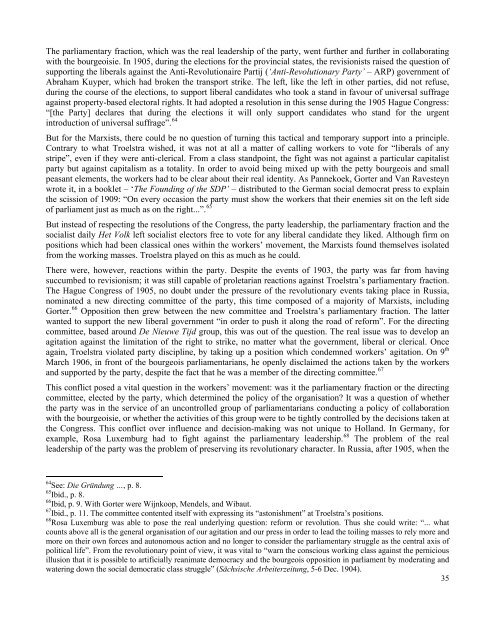The German-Dutch Communist Left - Libcom
The German-Dutch Communist Left - Libcom
The German-Dutch Communist Left - Libcom
You also want an ePaper? Increase the reach of your titles
YUMPU automatically turns print PDFs into web optimized ePapers that Google loves.
<strong>The</strong> parliamentary fraction, which was the real leadership of the party, went further and further in collaborating<br />
with the bourgeoisie. In 1905, during the elections for the provincial states, the revisionists raised the question of<br />
supporting the liberals against the Anti-Revolutionaire Partij (‘Anti-Revolutionary Party’ – ARP) government of<br />
Abraham Kuyper, which had broken the transport strike. <strong>The</strong> left, like the left in other parties, did not refuse,<br />
during the course of the elections, to support liberal candidates who took a stand in favour of universal suffrage<br />
against property-based electoral rights. It had adopted a resolution in this sense during the 1905 Hague Congress:<br />
“[the Party] declares that during the elections it will only support candidates who stand for the urgent<br />
introduction of universal suffrage”. 64<br />
But for the Marxists, there could be no question of turning this tactical and temporary support into a principle.<br />
Contrary to what Troelstra wished, it was not at all a matter of calling workers to vote for “liberals of any<br />
stripe”, even if they were anti-clerical. From a class standpoint, the fight was not against a particular capitalist<br />
party but against capitalism as a totality. In order to avoid being mixed up with the petty bourgeois and small<br />
peasant elements, the workers had to be clear about their real identity. As Pannekoek, Gorter and Van Ravesteyn<br />
wrote it, in a booklet – ‘<strong>The</strong> Founding of the SDP’ – distributed to the <strong>German</strong> social democrat press to explain<br />
the scission of 1909: “On every occasion the party must show the workers that their enemies sit on the left side<br />
of parliament just as much as on the right...”. 65<br />
But instead of respecting the resolutions of the Congress, the party leadership, the parliamentary fraction and the<br />
socialist daily Het Volk left socialist electors free to vote for any liberal candidate they liked. Although firm on<br />
positions which had been classical ones within the workers’ movement, the Marxists found themselves isolated<br />
from the working masses. Troelstra played on this as much as he could.<br />
<strong>The</strong>re were, however, reactions within the party. Despite the events of 1903, the party was far from having<br />
succumbed to revisionism; it was still capable of proletarian reactions against Troelstra’s parliamentary fraction.<br />
<strong>The</strong> Hague Congress of 1905, no doubt under the pressure of the revolutionary events taking place in Russia,<br />
nominated a new directing committee of the party, this time composed of a majority of Marxists, including<br />
Gorter. 66 Opposition then grew between the new committee and Troelstra’s parliamentary fraction. <strong>The</strong> latter<br />
wanted to support the new liberal government “in order to push it along the road of reform”. For the directing<br />
committee, based around De Nieuwe Tijd group, this was out of the question. <strong>The</strong> real issue was to develop an<br />
agitation against the limitation of the right to strike, no matter what the government, liberal or clerical. Once<br />
again, Troelstra violated party discipline, by taking up a position which condemned workers’ agitation. On 9 th<br />
March 1906, in front of the bourgeois parliamentarians, he openly disclaimed the actions taken by the workers<br />
and supported by the party, despite the fact that he was a member of the directing committee. 67<br />
This conflict posed a vital question in the workers’ movement: was it the parliamentary fraction or the directing<br />
committee, elected by the party, which determined the policy of the organisation? It was a question of whether<br />
the party was in the service of an uncontrolled group of parliamentarians conducting a policy of collaboration<br />
with the bourgeoisie, or whether the activities of this group were to be tightly controlled by the decisions taken at<br />
the Congress. This conflict over influence and decision-making was not unique to Holland. In <strong>German</strong>y, for<br />
example, Rosa Luxemburg had to fight against the parliamentary leadership. 68 <strong>The</strong> problem of the real<br />
leadership of the party was the problem of preserving its revolutionary character. In Russia, after 1905, when the<br />
64 See: Die Gründung …, p. 8.<br />
65 Ibid., p. 8.<br />
66 Ibid, p. 9. With Gorter were Wijnkoop, Mendels, and Wibaut.<br />
67 Ibid., p. 11. <strong>The</strong> committee contented itself with expressing its “astonishment” at Troelstra’s positions.<br />
68 Rosa Luxemburg was able to pose the real underlying question: reform or revolution. Thus she could write: “... what<br />
counts above all is the general organisation of our agitation and our press in order to lead the toiling masses to rely more and<br />
more on their own forces and autonomous action and no longer to consider the parliamentary struggle as the central axis of<br />
political life”. From the revolutionary point of view, it was vital to “warn the conscious working class against the pernicious<br />
illusion that it is possible to artificially reanimate democracy and the bourgeois opposition in parliament by moderating and<br />
watering down the social democratic class struggle” (Sächsische Arbeiterzeitung, 5-6 Dec. 1904).<br />
35
















